Gaming PCs weigh more than a usual PC due to the addition of multiple components suitable for high-end gaming, such as high-performance graphics cards, enhanced cooling systems, high-wattage power supply units, sturdy PC cases, and customizations like RGB in gaming.
Key Takeaways
- Gaming PCs tend to weigh more than usual due to factors like their build, casing, GPUs, customization, and cooling system.
- The PC components have different weights, including the motherboard, GPU, PSU, RAM, SSD, and hard drives.
- A PC without a GPU is comparatively lighter than one with a GPU.
A gaming PC can be as heavy as 36 Kg (80 lbs.) or more.[1] Of course, the weight of the PC varies from one to another. A normal daily-use PC is much lighter than a gaming PC. All that matters is the components placed inside the PC that determine the real weight of your PC.
PC Tower
The weight of the computer case varies with the use it has been made for. If the case is designed for gaming, it may come with fans and dual chambers to keep the temperature low, among many more.[2] Fancy PC cases may be made of tempered glass and have RGB lighting.
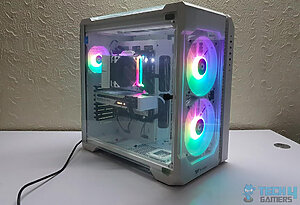
On the other hand, budget PC cases may be simple. If the purpose of the PC is to save power, then it may use lighter-weighing components. Here is the average weight of PC cases depending on their type.
| Weight | High-end PC Case | Mid-End PC Case | Budget PC Case |
|---|---|---|---|
| Weight in Pounds | 35 lbs. | 27 lbs. | 20 lbs. |
| Weight in Kg | 15.8 Kg | 12.2 Kg | 9 Kg |
Motherboard
Motherboards may appear lightweight, but their weight can range from 0.45 Kg (1 lb.) to 1.5 Kg (3.3 lbs.). The weight of the motherboard has a lot to do with its features, how long it has been out, and its build.
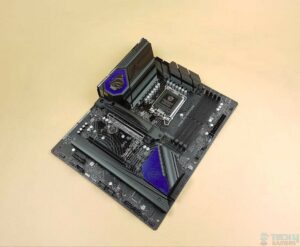
The weight of a motherboard is influenced by the number of circuits, input/output sockets, and component slots it accommodates. A motherboard with more extensive connectivity options and component slots tends to be heavier. Check out this guide to learn the essentials for buying a motherboard.
Processor
CPUs only weigh a couple of grams, and modern CPUs have become lighter than before. Processors’ average weight is usually from 42 grams (0.1 lbs.) to 85 grams (0.2 lbs.) Besides this, it is crucial to maintain CPU temperature below 70°C while gaming to prevent overheating.[3]
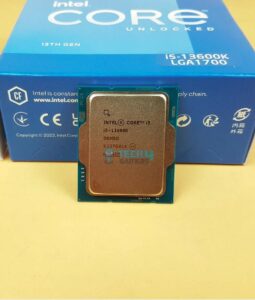
GPU
While reviewing many graphics cards over the years, we found that the GPU’s weight varies from model to model. The manufacturing materials, fans, and manufacturer play a big role in deducing its weight. Plus, a better quality, high-end GPU will be built with the best materials, which may add to the weight, so buy a GPU that fulfils your requirements.
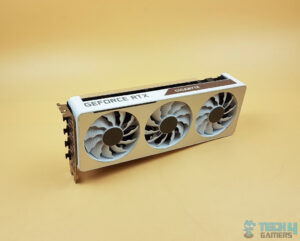
On the other hand, a mid-end GPU and a budget GPU will be lighter. A high-end GPU can weigh as much as 1.5 Kg (3.3 lbs.), while a mid-end GPU may weigh around 0.6 Kg (1.3 lbs.). However, a budget GPU’s average weight can be as low as 0.18 Kg (0.4 lbs).
Do PCs Without GPU Weigh Considerably Less?
Many people may not put in an entirely other GPU and choose to use the integrated GPU with most PC processors.[4] This is not a bad choice, but it surely raises the question of whether not having another GPU significantly affects the weight of the PC tower.
As mentioned above, the weight of the GPU lies somewhere around 1.5 Kg to 0.18 Kg. To answer the question, the PC’s weight may be around 4.5 Kg to 13.6 Kg (10 lbs. to 30 lbs.). Therefore, you may notice a significant weight reduction in your PC tower without a GPU.
Power Supply Unit
The main thing that generally determines the weight of a PSU is the amount of power it supplies. The better-built quality and high power supply, the heavier it is. The weight also varies depending on the size and the manufacturer of the PSU.
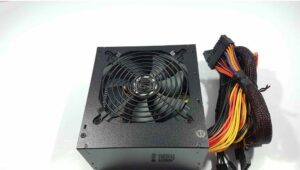
Low power supply and budget PSU may weigh around 1.13 Kg (2.5 lbs.). As you go higher to a more intense power-supplying PSU, you’ll be able to find that it can weigh as much as 2 Kg (5 lbs.). So, know how much power a gaming PC uses to pick the right PSU for your setup. Also, PSU lasts five to ten years, so you can replace it before it halts functioning.
PC Coolers
All the data processing requires intense power, causing the components to heat up. Therefore, gamers install several fans in their computer case to eliminate the risk of damaging their components through overheating. While normal PC coolers weigh around 0.45 Kg (1 lb.), more intensive ones can increase to about 2 Kg (4.4 lbs.).
Moreover, high-end builds often have a water cooling system with multiple wires and pipes leading the water, which is considered more efficient.[5] These cooling systems add more weight to your PC than you think.
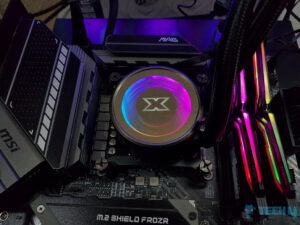
RAM
RAM modules are generally lightweight, but the total weight increases with the number of sticks installed. You can find the newer RAM sticks with pre-installed RGB to enhance your build’s overall look. Depending on the type of RAM and factors mentioned above, the overall weight may range from 28 grams (0.06 lbs.) to 127 grams (0.28 lbs.).
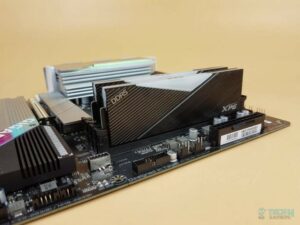
Hard Drive
A hard drive’s weight entirely depends on its storage capacity. A 4TB hard drive weighs around 0.69 Kg (1.53 lbs.). You can find higher storage capacity on external hard drives, which can be as high as 26 TB. However, as you go to lesser storage hard drives, a 500GB hard drive can weigh as low as 0.4 Kg (0.9 lbs.).
SSD
SSDs are the better option to increase your storage capacity. They weigh less than hard drives and can hold a higher storage capacity.[6] The weight of an SSD varies depending on brand, build quality, and storage capacity. A 2.5 SSD weighs as low as 30 grams (0.06 lbs.) and goes up to 70 grams (0.15 lbs.).
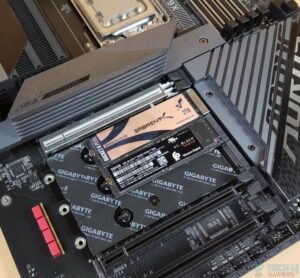
Conclusively, as I mentioned, a PC’s weight depends on many factors and varies with the components installed in the case. If you are trying to look up accurate results on how much a particular component weighs, search it online, and you will most likely find it. You can also take a rough measure using the averages I have provided based on several factors.
More About Gaming PCs:
- How to Build a Gaming PC In 2023: The Definitive Guide
- How Many Watts Does A Gaming PC Use?
- How Long Do Gaming PCs Last? [Full Guide]
- How Much Does It Cost To Build A PC: Gaming & Budget
References:
-
VOGONS. What’s the heaviest CRT you’ve set on a desktop? Retrieved from https://www.vogons.org/viewtopic.php?t=48767
-
Make A Mini Marvel. Retrieved from https://www.mclibre.org/descargar/docs/revistas/custom-pc/custom-pc-219-en-202110.pdf
-
Jack Robertson. What is a good CPU temperature? A guide to keeping your processor cool. Retrieved from https://www.noyafa.com/es/blogs/base-de-conocimientos/que-es-una-buena-temperatura-de-la-cpu-una-guia-para-mantener-a-su-procesador-fresco
-
Steinberg. Integrated graphics or dedicated GPU? (Windows PC). Retrieved from https://forums.steinberg.net/t/integrated-graphics-or-dedicated-gpu-windows-pc/147393
-
Princeton University. Outdoor Action Guide To Hypothermia And Cold Weather Injuries. Retrieved from https://www.princeton.edu/~oa/safety/hypocold.shtml
-
IBM. What is a Solid-State Drive? Retrieved from https://www.ibm.com/topics/solid-state-drives
Frequently Asked Questions
Gaming laptops are lighter. Their weight lies around 2.5 Kg (5.5 lbs.) to 3 Kg (7 lbs.)
An SSD is better because it has lesser weight and higher storage capacity. It is best to switch to SDD if you can.
Compared to other PC parts, monitors weigh the heaviest. They can weigh as much as 4.5 Kg (10 lbs.).
Thank you! Please share your positive feedback. 🔋
How could we improve this post? Please Help us. 😔
[Wiki Editor]
Ali Rashid Khan is an avid gamer, hardware enthusiast, photographer, and devoted litterateur with a period of experience spanning more than 14 years. Sporting a specialization with regards to the latest tech in flagship phones, gaming laptops, and top-of-the-line PCs, Ali is known for consistently presenting the most detailed objective perspective on all types of gaming products, ranging from the Best Motherboards, CPU Coolers, RAM kits, GPUs, and PSUs amongst numerous other peripherals. When he’s not busy writing, you’ll find Ali meddling with mechanical keyboards, indulging in vehicular racing, or professionally competing worldwide with fellow mind-sport athletes in Scrabble at an international level. Currently speaking, Ali has completed his A-Level GCEs with plans to go into either Allopathic Medicine or Business Studies, or who knows, perhaps a full-time dedicated technological journalist.
Get In Touch: alirashid@tech4gamers.com


 Threads
Threads

![What is CAS Latency? [Definitive Guide] What is CAS Latency](https://tech4gamers.com/wp-content/uploads/2023/04/What-is-CAS-Latency-218x150.jpg)

![What Is A PC Radiator? [Sizes, Mountings, Direction & Guide] PC Radiators](https://tech4gamers.com/wp-content/uploads/2023/08/HOW-TO-5-2-218x150.jpg)